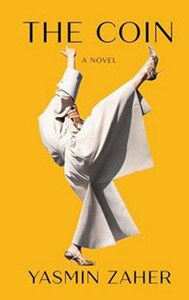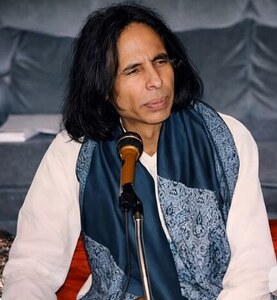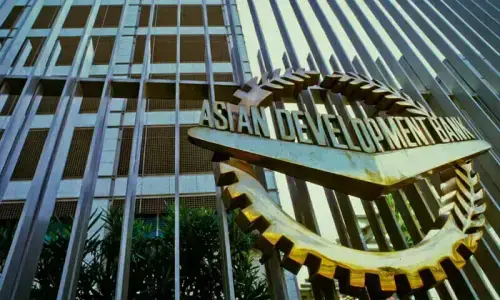
Ayesha Manazir Siddiqi’s debut novel, The Centre, takes readers into a cutthroat world of language, translation and power dynamics. Set in Karachi, London and New Delhi, the work explores the consequences of multilingualism, ambition and linguistic colonialism.
Siddiqi’s protagonist, Anisa Ellahi, is a Pakistani based in London since her young adulthood. She makes a living subtitling Bollywood films. The Islamophobic politics of some films bothers her, as she grapples with the job’s banality and feelings of professional inadequacy. To relax, she spends time with her best friend Naima and a cat she names Billee.
Siddiqi captures Anisa’s struggles, including her frustrating relationship with a white boyfriend, Adam. Having shown no promise in Urdu before, this man suddenly acquires fluency. It is Adam’s revelation of the mysterious “Centre”, a language programme offering complete mastery after just 10 days, that kick-starts Anisa’s career arc.
With its focus on language learning, The Centre fills a gap in my life I didn’t even know it had. As someone who started learning Hindi early in the coronavirus pandemic and later ventured into the realm of Urdu, Siddiqi’s novel resonates with me on a personal level. I don’t feel ‘seen’, exactly, but it’s as though someone has overheard my faltering spoken Hindustani.
The novel invites readers to reflect on linguistic hierarchies and the dominance of certain languages over others. To pose a question Siddiqi asks in an essay, “What happens when you take on someone else’s tongue?”
Just as Siddiqi’s characters wrestle with their own linguistic competency, her novel makes me think more self-critically about my journey into Urdu. My entitlement as a dominant language speaker is something I’ve wanted to be mindful of from the outset. However, the idea that everything must be accessible to me and other English-speakers is as ingrained as it is damaging. This tenacious idea is one that the novel tries to challenge through its explorations of the politics of language learning.
Above all, Siddiqi encourages an interrogation of white privilege. When Anisa takes Adam to visit her family in Karachi, he delights in the city’s “incredible hospitality.” This irks Anisa, who knows that brown or black people wouldn’t receive such treatment if they similarly tried out their Urdu on Karachiites.
“What Adam was witnessing,” she remarks acidly, “were the remnants of a culture where once he was, by law, obeyed and pacified.” The warm welcome he enjoys is “a legacy of his people’s wrongdoing.”
I, too, have benefited from this shameful legacy.
In an interview with me, Siddiqi alludes to the role of English in Pakistan itself. Imperial residue means it is esteemed above Urdu and seen as a status symbol. “It is undeniable,” she says, “that some languages are preferred over others, that some have higher value and are even considered to be more ‘sophisticated,’ to be the carriers of more intellectual thought. This is not coincidental; it is constructed.”
For this reason, among others, Anisa thinks that becoming a “real translator” or even a more fulfilled person would involve the acquisition of European languages. “The greats,” she wonders, “Dostoyevsky, Tolstoy, Chekhov … what is it that makes them so great? Could it be something in the language itself?”
Like her now ex-boyfriend before her, Anisa takes immersive courses at the Centre. She becomes fluent first in German and then Russian. The speed of this comes at a sinister and undisclosed cost, so readers are invited to probe the ethical implications of language acquisition.
Like Anisa, Siddiqi tells me that she moved to the United Kingdom from Pakistan at 18. Her Urdu was far from perfect to begin with, and still isn’t, but “it’s always felt important to hold on to.” She taught beginners Urdu for a while, and has translated texts from both French and Urdu into English. As such, she relates to Anisa’s desire to become a translator.
Bilingualism plays a prominent role in the novel. Siddiqi weaves words such as “matlabi” [selfish] and phrases such as “araam se” [easy] into the narrative. Wordplay dances across the pages, enhancing the novel’s brilliance. Echo-pairs, such as “YouTube shoetube,” “Tinder-shinder” and “iClouds shy-clouds” are striking.
Siddiqi tells me that her intention was not humour, and that she rejects a writerly code-switching that can be mocking or othering. She thinks authors sometimes take their mother tongue and translate it for the white gaze, to evoke masala or a sense of the exotic.
By contrast, she notes, “I tried to write as I speak, to write as if I were telling the story to my sister, for instance, or my mother, or my best friend. This allows for a certain intimacy, I hope, and also for a resistance to the white gaze.”
She expresses satisfaction that, at no point during the process of publishing with London’s Picador, was there resistance or questioning of her use of Urdu. “This feels like a move forward from the times of glossaries or the unnecessary italicisation of ‘foreign’ words in novels. Foreign to whom, exactly?”
Naima, Anisa’s best friend, may have Mirpuri heritage, since she expresses an interest in learning Paharri at the Centre. Yet, this character recognises that an oral language — such as this one from Azad Kashmir — is in a weaker position than Urdu or Hindi and, therefore, unlikely to be offered at an elite language school. In this way, the issue of regional asymmetries is raised.
In their introduction to Postcolonial Translation: Theory and Practice, Susan Bassnett and Harish Trivedi draw attention to translation’s vampiric tendencies. Translation, the scholars conclude, “may be likened to a blood transfusion, where the emphasis is on the health and nourishment of the translator.”
Siddiqi puts such debates centre stage, unsettling the notion that translation involves bridge-building. Instead, The Centre highlights its role in devouring other languages and cultures. This bitingly satirical novel shows how (neo)colonising groups strip marginalised languages of their autonomy and cachet. Rather than a tool of communication and aesthetic enjoyment, language becomes a vehicle for domination and the erasure of heritage.
The columnist is Professor of Global Literature at the University of York and author of three books.
She tweets @clarachambara
Published in Dawn, Books & Authors, June 25th, 2023































